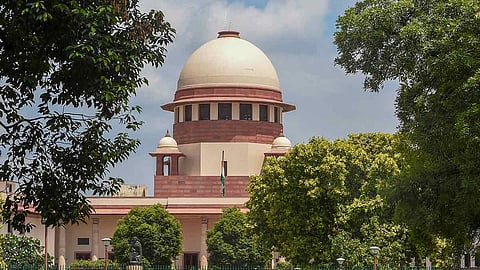

The Union Government on Thursday, April 17, told the Supreme Court that it would not appoint non-Muslim members to the Central Waqf Council or State Waqf Boards under the Waqf (Amendment) Act, 2025, during the hearing. The submission by the Union government also said that Waqf properties would not be de-notified in the interim.
A bench headed by Chief Justice of India (CJI) Sanjiv Khanna and comprising Justices Sanjay Kumar and KV Viswanathan was hearing a batch of petitions challenging the constitutional validity of the recent amendments introduced in the Waqf Act, 1995.
According to LiveLaw, Solicitor General Tushar Mehta, appearing for the Union, submitted that non-Muslims would not be appointed to Central Waqf Councils and State Waqf Boards during the hearing. He also submitted that Waqfs, including Waqf-by-user, whether declared by way of notification or registration, would not be de-notified till the next date of hearing. He also sought seven days for the Union government to file its response. The matter is now scheduled for further hearing on May 5.
The court expressed concerns over the potential impact of the amendments on existing Waqf properties. “We don’t want the situation prevailing today to change so drastically that it affects the rights of the parties,” CJI Khanna observed, and added that though courts do not ordinarily stay legislation, when a petition is pending, the existing status should not be altered.
The concept of ‘Waqf’, rooted in Islamic laws and traditions, refers to an endowment made by a Muslim for charitable or religious purposes, such as mosques, schools, hospitals, or other public institutions.
Solicitor General Mehta argued that the amendments stemmed from extensive public feedback, claiming that “villages were taken as Waqfs, private properties were taken as Waqfs. This affects a large number of innocent people.”
Senior advocate Kapil Sibal, appearing for the petitioners, argued that the amendments were unconstitutional. He objected to the removal of Waqf-by-user recognition and the inclusion of non-Muslim members. “They will ask us for deeds for Waqfs created 300 years ago. These won’t exist,” he said.
The apex court on April 16 proposed to issue an interim order directing that no properties declared as Waqf be de-notified during the case. The bench also said that the provision of the Amendment Act, which says that a Waqf property would not be treated as a Waqf while the Collector is conducting an inquiry on whether it is government land, would not be given effect and that all members of the Waqf boards and the Central Waqf Council, except the ex-officio members, should be Muslims.
The court had also raised several questions to the Union government regarding the implications of the Waqf (Amendment) Act, including whether all Waqf-by-user properties would now cease to exist as Waqf under the amended law. The court also expressed concern over the practicality of asking Waqf-by-user properties, many of which have existed for centuries, to now undergo registration; CJI Sanjiv Khanna specifically cited the example of Delhi’s Jama Masjid in this context.
Another issue raised was whether it was fair to deny a property the status of Waqf until an authorised government officer completes an enquiry into whether it belongs to the state. The bench also sought clarification on whether, after the amendments, the majority composition of the Central Waqf Council and State Waqf Boards would remain Muslim.
Multiple petitions have been filed before the Supreme Court challenging the constitutional validity of the Waqf (Amendment) Act, 2025, which recently received Presidential assent after being passed by Parliament in early April. The petitioners, including Congress MP Mohammad Jawed, AIMIM chief Asaduddin Owaisi, Delhi AAP MLA Amanatullah Khan, TMC MP Mahua Moitra, Communist Party of India, Dravida Munnetra Kazhagam and several civil society and religious organisations, argued that the amendments violate fundamental rights guaranteed by the Indian Constitution. The Congress has termed the law an attack on the Constitution’s basic structure, aimed at dividing the country along religious lines.
While the petitioners seek a stay on the implementation of the amended law, the Union government has filed a caveat in the Supreme Court, asserting that it must be heard before any interim relief is granted. Defending the law, the Union government has claimed that the amendments would benefit “crores of poor Muslims” without harming individuals. Several BJP-ruled states, including Haryana, Maharashtra, Assam, and Rajasthan, have also approached the court to support the legislation.